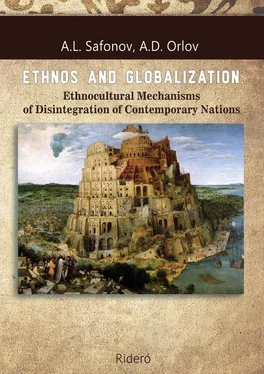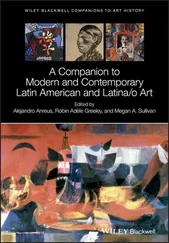This outwardly paradoxical coexistence of social regression and scientific and technical progress characteristic of globalization, however, creates cause for the deeper and irreversible fragmentation and archaization of society on a local and global level.
The united world, on which many hopes were pinned (unable to come true, as is evident today), has in reality become a global crisis, with global catastrophe as a future possibility.
While in the 1990s globalization was thought of as global equilibrium, a compromise signifying the beginning of a new era of sustainable development in the form of a united humankind, it is obvious these days that globalization is the final stage of the economic and social progress of the nineteenth and twentieth centuries that has exhausted itself.
The global unity of the world did not engender a global noospheric synthesis, not a united humankind, but gave way to a global systemic crisis in all spheres of human existence, which is the essential basis of globalization. 174 174 Safonov, A. L., Orlov, A. D. Globalization: crisis of global system as system of crises // Social-Humanitarian Knowledge. 2012. №2 – p. 114—125.
In two decades of the transitional period to the global world, a complicated system of crises in separate spheres of social existence took form, each not only potentially dangerous in itself, but also capable of provoking a crisis in linked areas.
Therefore, the interaction of separate crises gives way to a new, systemic quality, a possibility of catastrophic generalization of crisis phenomena.
While crisis in a separate sphere of life – for example, an energetic or demographic one – is usually a gradual and predictable accumulation of imbalance, an establishment of positive feedback describes a catastrophic character to the crisis, similar to self-accelerating physical processes such as chain nuclear and chemical reactions.
Basically, particular global crises include the financial-economic crisis, resources and demographics crises, political, ecological and other crises, each of which may provoke global instability.
The crisis of system-building social structures and institutions has been realized even less, with outward manifestations such as the growth of social stratification, the crisis of family and marriage relations, the lack of social elevators and the growth of social tension.
One of the most important aspects of the global social crisis is the crisis of the nation state as a system-building element of the global political and economic system. While in previous historical stages the crisis of separate social systems had a local, isolated character, globalization is transforming local communities into open off-balance systems, linked by economic, information and migration channels as a spontaneous outflow of instability and purposeful export of instability, which has significantly reduced the stability of separate states and of the whole global system. At the same time, the crises in separate nation states have a ubiquitous, almost simultaneous character, having similar mechanisms and development scenarios.
The appearance of a global supra-state social system may be considered a fait accompli; however, the character of global unity as a qualitatively new phenomenon has not been studied and has not yet been fully realized. Despite the forecasts, the global system has not became a global state with its usual attributes. Despite declarations, this system does not regulate or freeze conflicts or contradictions, local or global. Global unity of connections has not solved contradictions and has not led to the convergence of parts into a harmonious noospheric whole. Moreover, we may see a noticeable lowering of the stability of development on the level of elements and on the level of the whole.
The unity of the world born out of globalization has become not only a sociocultural synthesis for all humankind but a global conflict whose reason is the increase in global interconnectedness. The world united as the field of an all-encompassing global battle in which the fate of all actors in the global fight is decided, of peoples, states, social communities. At the same time, the important consequence of globalization is the impossibility of avoiding conflict because of its all-encompassing character. From this point of view, a global systemic crisis is similar to the arena of the Roman circus, which was impossible to escape.
Characteristically, just like in the parable of the blind men and the elephant, researchers focus on sub-crises in separate spheres and their particular aspects and, as a result, considerably underestimate the catastrophic nature, irreversibility and lack of control of globalization.
Many theoretical researchers reduce the global systemic crisis to its economic, political, resource, demographic or ecological components; sociologists study the crises of separate social institutions without taking into consideration the connections between crisis processes.
The illusion of predetermination, the pre-arrangement of the historical development typical of major religious systems and of national and civilizational projects whose ideologies are detailed self-fulfilling prophecies, stands in the way of the realization of the threats of the global crisis.
The certainty of political and religious leaders and the masses in the fact that all historical development trajectories inevitably lead society to a pre-determined, ideologized social ideal – the open society, the heavenly kingdom on Earth, the global caliphate, communism or noosphere – stands in the way of understanding the essential unpredictability, instability, catastrophic and regressive character of the ongoing global process, which does not, in principle, fit into the limits set by the theories and ideologies of the twentieth century.
Compared to the twentieth century, the attainability of social ideals has become much lower under conditions of global openness coupled with the lack of resources.
Globalization turned out to be a transition from an era of progress that has exhausted its development potential to a regressive descending era of development whose characteristics include complexity, catastrophic nature, instability, liability for conflict and competitiveness.
The transition to regressive development does not mean simplification and primitivization of the social reality, even in cases of the death or disappearance of significant social structures and agents.
The appearance of new connections and degrees of freedom under the conditions of sharpening of wide range of divergent processes, during which new social agents and structures appear.
The all-encompassing social dissolution, with enormous resources previously collected by humankind, inevitably gives way to a new social complexity, a wide range of dissipative structures engendered by the openness and off-balance nature of social systems.
At the same time, processes of social regression often imitate progressive development (reforms, modernization) or fit into system-building social institutions, state ones mostly. From this point of view, the growth of organized crime and corruption and their integration into power institutes is a typical indicator of the transition of humankind into a phase of protracted regression.
The strengthening and collecting of contradictions, objectively coming from the lack of vitally important resources, gives objective cause to the new differentiation, fragmentation and polarization, to the appearance of qualitatively new non-spatial borders among conflicting social agents, creating cause for new social synthesis, the birth of new agents of the global development. So, processes of unification, typical of globalization, engender compensating counteraction on a local level, taking on various forms of ethnic and regional separatism, regional fundamentalism and other forms of social fragmentation and group antagonism. 175 175 Safonov, A. L., Orlov, A. D. Ethnos and nation as agents of globalization // Socio-Humanitarian Knowledge. 2011. №4 – p. 218—232.
Читать дальше












